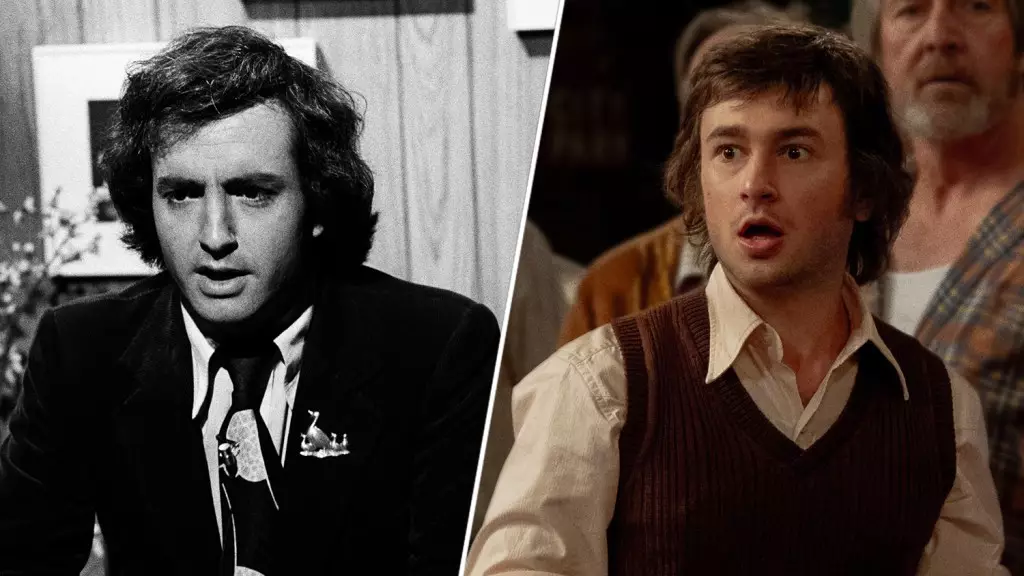Gabriel LaBelle’s foray into his latest role—as a young Lorne Michaels in the upcoming film ‘Saturday Night’—took him to the very heart of one of television’s most enduring institutions: Saturday Night Live (SNL). This experience provided LaBelle with a unique opportunity to immerse himself in the world of Michaels and the iconic late-night show that transformed the television landscape since its inception in 1975. He reminisced about his visit to the legendary 30 Rockefeller Plaza—a cultural landmark that has served as the backdrop for countless comedic gems.
During those initial days of filming in New York City, LaBelle and a select group of cast members had the chance to witness a live taping of SNL, experiencing firsthand the electric atmosphere that surrounds the show. In his conversation with IndieWire, LaBelle recounted how welcoming Michaels was, inviting the cast to enjoy the live performance featuring Josh Brolin. Such moments not only speak to Michaels’ character as a producer but also offer LaBelle insights into the pressures and excitement surrounding the show’s creation.
After the live taping, LaBelle had the chance to briefly converse with Lorne Michaels, along with other prominent figures from the film, including director Jason Reitman and various cast members. The star’s anecdote reveals a fascinating aspect of show business—the intermingling of those who create and those who observe. While LaBelle may not have contributed overly to the conversation, simply being present among these influential figures provided him with a wealth of experience that undoubtedly shaped his portrayal of Michaels in the film.
The reverberations of this experience undoubtedly extend beyond the filming period. LaBelle recognizes the monumental expectations of portraying such a critical figure in the comedy world. This recognition of the legacy of Lorne Michaels underscores the broader theme of the film, which focuses on how a group of young, passionate comedians came together to redefine the boundaries of television comedy.
‘Saturday Night,’ originally titled ‘SNL 1975,’ is anchored in the behind-the-scenes events leading up to the inaugural episode of SNL in October 1975. This pivotal moment in television history features a fierce group of writers and performers who turned the television landscape on its head. The film invites audiences to witness not only the comedic brilliance that would flourish on that fateful night but also the struggles and triumphs of the individuals who contributed to the show’s creation.
Through a carefully constructed narrative, audiences will see how the pressure of live television, coupled with creative clashes among writers and performers, paved the way for comedy that remains relevant. By shining a light on the human experience behind the scenes, the film elevates the narrative of SNL beyond mere entertainment into a story of resilience, creativity, and the evolution of comedy itself.
One crucial element of the film’s exploration of SNL is the relationship LaBelle’s character embodies with Michaels. In interviews, LaBelle expressed uncertainty about whether Michaels had viewed his performance, though he believes that director Jason Reitman remains in contact with him. The mystique surrounding Michaels, as described by Reitman, adds another layer to this narrative—Michaels’ cryptic nature and his role as the elusive mastermind behind SNL brings an air of complexity to the film.
This intrigue is not only compelling for those in the entertainment industry but also for audiences who idolize these television titans. LaBelle’s journey and the film’s ambitious portrayal invite viewers to reflect on the meticulous effort that goes into creating a cultural phenomenon.
As ‘Saturday Night’ prepares for its nationwide release, audiences can expect an exploration of foundational moments in television history, spotlighting the spirited innovators who broke the mold. With a cast that includes rising stars and seasoned actors alike, the film promises to bring forth an ode to the transformational power of laughter and the enduring legacy of Lorne Michaels and his indelible mark on comedy. As they step into theaters, moviegoers will not just witness the history of SNL; they will experience the birth of an enduring cultural institution that continues to both entertain and influence generations.

Leave a Reply